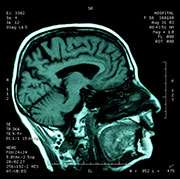Epilepsy surgery gets high marks from patients in survey

(HealthDay)—More than nine in 10 epilepsy patients who had brain surgery to try to control their seizures are happy they did so, a new survey reveals.
The review appears to be driven by the fact that patients saw the number of debilitating seizures they experienced after surgery either drop significantly or disappear altogether, the researchers noted.
"One percent of the U.S. population has epilepsy, and among that group there are about 750,000 patients with recurring seizures that are not well-controlled," said study co-author Dr. Marianna Spanaki-Varelas, director of the Henry Ford Comprehensive Epilepsy Program at Henry Ford Hospital in Detroit. "Of those, 30 to 35 percent are [surgical] candidates because they do not respond to the roughly 15 appropriate epilepsy drugs that we have."
A great majority of those who have surgery say it was worthwhile because many remain seizure-free long after surgery and many see a big improvement in their quality of life, Spanaki-Varelas noted.
The survey findings are published in the February issue of Epilepsy & Behavior.
The surgery, during which a portion of the brain is removed to treat debilitating seizures, is typically reserved for patients whose seizures originate in a single spot in the brain.
"We would not operate on people who have more than one spot of the brain that generates seizures," Spanaki-Varelas said. "And we also would not operate on focal patients whose problem brain region is too close to areas that control motor or sensory function or speech."
That said, Spanaki-Varelas added that epilepsy surgery is still "highly underutilized in this country." She said only 1,500 Americans have the surgery each year, even though recent research has shown that the procedure is actually no more risky than hip replacement surgery.
"There is a misconception, even among physicians, that surgery should be considered the very last resort," Spanaki-Varelas explained. "But we should not delay surgery until all drugs are tried. If a patient fails on one, two or, at maximum, three medications, alone or in combination, then they need to be considered as [surgical] candidates."
That position, Spanaki-Varelas noted, is supported by the American Academy of Neurology.
To assess how well epilepsy patients fare following surgery, the study authors focused on a pool of 470 men and women with epilepsy. All had been operated on at Henry Ford between 1993 and 2011.
Of the group, 50 patients had died since surgery. After reviewing electronic medical records and recent clinic notes, the research team was ultimately able to conduct follow-up phone surveys with more than 250 patients.
On average, quality-of-life surveys were conducted nearly 11 years post-surgery, though more than one-quarter of the patients (27 percent) were reached more than 15 years following their initial operation.
The result: 92 percent of patients said they considered their surgery to be "worthwhile."
Slightly less than one-third said they were currently seizure-free, while three-quarters described the results of their surgery as "favorable," meaning total seizure relief or only rare occurrences of "disabling" seizures.
Those "favorable" outcomes held steady over time, seen among 77 percent of patients during the five years after surgery and among 78 percent of patients who reached the 15-year-plus mark.
Seizure-free status was somewhat less steady, seen among roughly 40 percent prior to the five-year mark, but only among 29 percent after five to 10 years. Between 10 and 15 years after surgery, the numbers rose back to 38 percent, only to drop to 26 percent among the 15-year-plus group.
On the quality-of-life front, one-fifth of the patients said they were no longer taking any kind of anti-seizure medication following surgery. What's more, although the use of antidepressants increased to 30 percent following surgery (up from 22 percent beforehand), 51 percent said they were able to drive post-surgery, compared with just 35 percent before.
Dr. Rama Maganti, director of the Wisconsin Comprehensive Epilepsy Program at the University of Wisconsin in Madison, said the findings weren't surprising, and agreed that some patients should be offered the surgery option sooner than is typically the case.
"Both neurologists and patients view it as a last resort," he said. "But in fact we think it should be done earlier rather than later, because the outcomes for patients who don't respond to medicine are usually the same regardless. And most patients can be evaluated for surgery using only noninvasive tests like an MRI or PET scan. So, there really is no point in delaying."
More information: There's more on epilepsy at the Epilepsy Foundation.
Copyright © 2015 HealthDay. All rights reserved.
















